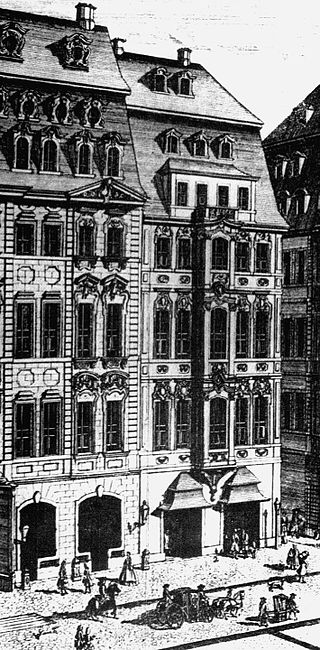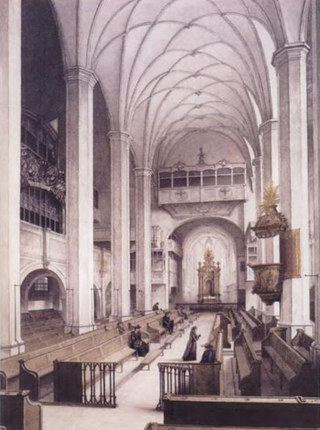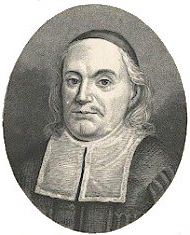Related Research Articles
The English mezzo-soprano Carolyn Watkinson is a singer of baroque music. Her voice is alternately characterized as mezzo-soprano and contralto.
SATB is an initialism that describes the scoring of compositions for choirs, and also choirs of instruments. The initials are for the voice types: S for soprano, A for alto, T for tenor and B for bass.

Bleib bei uns, denn es will Abend werden, BWV 6, is a cantata by Johann Sebastian Bach for use in a Lutheran service. He composed it in Leipzig in 1725 for Easter Monday and first performed it on 2 April 1725.

Schweigt stille, plaudert nicht, BWV 211, also known as the Coffee Cantata, is a secular cantata by Johann Sebastian Bach. He composed it probably between 1732 and 1735. Although classified as a cantata, it is essentially a miniature comic opera. In a satirical commentary, the cantata amusingly tells of an addiction to coffee.
The Monteverdi Choir was founded in 1964 by Sir John Eliot Gardiner for a performance of the Vespro della Beata Vergine in King's College Chapel, Cambridge. A specialist Baroque ensemble, the Choir has become famous for its stylistic conviction and extensive repertoire, encompassing music from the Renaissance period to Classical music of the 20th century. They often appear with John Eliot Gardiner's orchestras, the English Baroque Soloists and Orchestre Révolutionnaire et Romantique.
Charles Daniels is an English tenor, particularly noted for his performances of baroque music. He is a frequent soloist with The King's Consort, and has made over 25 recordings with the ensemble on the Hyperion label.
The King's Consort is a British period music orchestra founded in 1980 by the English conductor and harpsichordist Robert King. The ensemble has an associated choral group, Choir of The King's Consort. Together, they have made over 90 recordings, largely on the Hyperion label, and sold over 1,000,000 discs. The orchestra performs concert seasons in the UK and tours internationally.

Du wahrer Gott und Davids Sohn, BWV 23, is a church cantata by Johann Sebastian Bach. He composed it in Köthen between 1717 and 1723 for Quinquagesima Sunday and performed it as an audition piece for the position of Thomaskantor in Leipzig on 7 February 1723. The Sunday was the last occasion for music at church before the quiet time of Lent.
Notable recordings of Johann Sebastian Bach's St Matthew Passion (Matthäus-Passion) are shown below in a sortable table.
Kurt Equiluz was an Austrian classical tenor in opera and concert. He was a member of the Vienna State Opera as a tenor buffo from 1957 until 1983, remembered for roles such as Pedrillo in Mozart's Die Entführung aus dem Serail. He appeared regularly at the Salzburg Festival, including world premieres such as Rolf Liebermann's Penelope in 1954. He recorded works by Johann Sebastian Bach with conductors such as Michel Corboz, Helmuth Rilling and Charles de Wolff, and prominently as the Evangelist in the first recording of Bach's St John Passion on period instruments with the Concentus Musicus Wien in 1965, conducted by Nikolaus Harnoncourt.

Jan Kobow is a German classical tenor in concert, Lied, and Baroque opera.

Johann Sebastian Bach composed the church cantata Ich armer Mensch, ich Sündenknecht, BWV 55, in Leipzig for the 22nd Sunday after Trinity and first performed it on 17 November 1726.

Er rufet seinen Schafen mit Namen, BWV 175, is a church cantata by Johann Sebastian Bach. He composed the cantata in Leipzig for the third day of Pentecost and first performed it on 22 May 1725.

Johann Sebastian Bach composed the church cantata Ach Herr, mich armen Sünder, BWV 135 in Leipzig for the third Sunday after Trinity and first performed it on 25 June 1724. It is the fourth chorale cantata from his second annual cycle, and is based on the hymn by Cyriakus Schneegass.

Ich hab in Gottes Herz und Sinn, BWV 92, is a cantata by Johann Sebastian Bach for use in the Lutheran service. He composed the chorale cantata in Leipzig for Septuagesimae and first performed it on 28 January 1725. It is based on the hymn "Ich hab in Gottes Herz und Sinn" by Paul Gerhardt (1647), and is the only chorale cantata Bach based on a hymn by Gerhardt.

Marius van Altena, born Marius Hendrikus Schweppe is a Dutch tenor. He was one of the pioneers of historically informed performance of Baroque and Renaissance music. He has also sung Baroque opera, worked as conductor and as an academic teacher.
Carolyn Margaret Sampson is an English soprano in opera and concert. Specialising in historically informed performance, she has sung in Masaaki Suzuki's recording project of Bach cantatas and has appeared at the English National Opera.
Max Ciolek is a German tenor, conductor and composer. He is the founder of VokalEnsemble Köln. As a singer, he is noted for his recordings of Bach works, particularly the Evangelist in his Passions, but he has recorded music from all periods of classical music and has appeared internationally.
Emily Van Evera is an American soprano who specializes in early music and Baroque music in historically informed performance.
Julian Podger is an English tenor who has appeared mostly in concert in historically informed performance. He took part in the 2000 Bach Cantata Pilgrimage. He also sings in vocal ensembles, and directs his own ensemble, Trinity Baroque.
References
- 1 2 3 4 "Summer organ recitals 2018" (PDF). stmarylebow.org.uk. Church of St Mary-le-Bow. 2018. Retrieved 27 July 2022.
- ↑ Dyer, James (1998). The Stopsley Book. Bedfordshire, England: The Book Castle. pp. 150–151. ISBN 1871199042.
- ↑ "The engagement is announced" . Lynn Advertiser. British Newspaper Archive. 10 December 1937. p. 8 col.6. Retrieved 12 July 2022. (This source confirms that A. T. L. Covey-Crump was the second son of W. W. Covey-Crump.)
- ↑ "Up to standard: Harpenden Toc. H party's concert" . Beds and Herts Pictorial. British Newspaper Archive. 19 January 1932. p. 12 col.3. Retrieved 11 July 2022.
- 1 2 3 4 5 6 7 Knighton, Tess; Fallows, David (1997). Companion to Medieval and Renaissance Music. University of California Press. pp. xv–xvi. ISBN 9780520210813.
- 1 2 3 4 5 6 7 8 9 George Pratt (20 January 2001). Oxford Music Online (Grove Music Online): "Rogers Covey-Crump" . UK: Oxford University Press. doi:10.1093/gmo/9781561592630.article.45825. ISBN 978-1-56159-263-0 . Retrieved 28 July 2022.
- 1 2 3 4 5 6 James, David (14 March 2014). "The Hilliard Ensemble: saxes, crump-tenors and Arvo Pärt". The Guardian. Retrieved 25 July 2022.
- ↑ Bannatyne-Scott, Brian (18 May 2021). "A Singer's Life Pt15". edinburghmusicreview.com. Edinburgh Music Review. Retrieved 27 July 2022.
- 1 2 3 4 5 6 7 8 9 10 11 12 13 14 15 16 17 18 19 20 21 22 23 24 25 26 27 28 29 30 31 32 33 34 35 Oron, Aryeh; Zygan, Joanna (18 December 2019). "Rogers Covey-Crump (Tenor)". bach-cantatas.com. Bach Cantatas Website. Retrieved 24 July 2022.
- 1 2 3 4 5 6 7 "Bach St John Passion" (PDF). static1.squarespace.com. Wells Cathedral Oratorio Society. 29 March 2014. Retrieved 27 July 2022.
- 1 2 Evans, Fiona (2016). "Our Phoenix Choir patrons: Rogers Covey-Crump". phoenixchoir-eastbourne.co.uk. Phoenix Choir, Eastbourne. Retrieved 26 July 2022.
- 1 2 3 4 5 6 7 "Rogers Covey-Crump (tenor)". Rogers Covey-Crump (tenor). Hyperion. Retrieved 26 July 2022.
- ↑ "Box & Fir: music and songs from Jane Austen's era, on original instruments at St Mary's". portseaparish.co.uk. The Parish of St Mary Portsea. 2020. Retrieved 26 July 2022.
- ↑ O'Gorman, Christopher (30 December 2015). "Let's look back, shall we". christopher-ogorman.co.uk. Christopher O'Gorman tenor. Retrieved 26 July 2022.
- 1 2 "Under the Greenwood Tree". villagesmusicfestival.org. The Villages Music Festival. 2022. Retrieved 26 July 2022.
- ↑ "Merton choral and organ scholarships: a choral scholar at Merton" (PDF). merton.ox.ac.uk. Merton College, Oxford. Retrieved 26 July 2022.
- ↑ "The Hilliard Ensemble Photos of The Hilliard Ensemble from their 40 years of performing". bbc.co.uk. British Broadcasting Company. 2022. Retrieved 24 July 2022.
- ↑ James, David (27 August 2008). "Edinburgh festival 2008 Sing-along-a-Kafka". The Guardian. Retrieved 25 July 2022.
- ↑ Jack, Adrian (31 July 1995). "Proms The King's Consort/Robert King, The Royal Albert Hall, London/BBC Radio 3". The Independent. Retrieved 27 July 2022.
- 1 2 3 Kemp, Lindsay. "Purcell Complete Anthems & Services, Vol.2". gramophone.co.uk. Gramophone. Retrieved 25 July 2022.
- ↑ "Old and the new provide excellent recital" . Buckinghamshire Examiner. British Newspaper Archive. 12 June 1970. p. 5 col.1. Retrieved 27 July 2022.
- ↑ Bennett, Jill (June 2013). "The IOF @ 50" (PDF). organfestival.com. St Albans international Organ Festival. Retrieved 27 July 2022.
- ↑ "London diary for March: Saturday March 3rd". The Musical Times. No. Vol.20, no, 1632. Musical Times Publications Ltd. Jstor. February 1979. pp. 173–176. JSTOR 963968 . Retrieved 27 July 2022.
- ↑ "Snippets" . Derby Express. British Newspaper Archive. 21 March 1996. p. 22 col.8. Retrieved 27 July 2022.
- ↑ "The bite of Bach with Woodmansterne Collection at St Albans Abbey". The Herts Advertiser. 29 November 2009. Retrieved 27 July 2022.
- ↑ Anderson, Nicholas (20 January 2012). "Bach: St Matthew Passion". Classical Music/BBC Music Magazine. Retrieved 27 July 2022.
- ↑ Benson-Wilson, Andrew (29 February 2016). "Conductus 3: Music & Poetry from 13th century France". andrewbensonwilson.org. Andrew Benson-Wilson : Early Music Reviews +. Retrieved 26 July 2022.
- ↑ Pinnock, Andrew (Summer 2013). "Music" (PDF). southampton.ac.uk. University of Southampton. Retrieved 26 July 2022.
- ↑ Sealey, Mark (2011). "Anonymous music and poetry from thirteenth-century France". musicweb-international.com. Music Web International. Retrieved 26 July 2022.
- ↑ Rogers, Curtis (26 February 2019). "Monteverdi's Vespers Resounded Authoritatively in the Colourful Confusion of Keble College Chapel". seenandheard-international.com. Seen and Heard. Retrieved 26 July 2022.
- ↑ Covey-Crump, Rogers (26 November 1992). Paynter, John (ed.). "Vocal Consort Style and Tunings" in Companion to Contemporary Musical Thought. London: Routledge. pp. 1020–1050. ISBN 978-0415019903. and ISBN 0-415-07225-5
- ↑ "Music of the Gothic Era: Early Music Consort of London" . Sunday Tribune. British Newspaper Archive. 6 July 2003. p. 57 col.8. Retrieved 27 July 2022.
- ↑ "Mass in B minor BWV 232". bach-cantatas.com. Bach Cantatas Website. 12 February 2020. Retrieved 26 July 2022.
- ↑ Oron, Aryeh; Braatz, Thomas (12 February 2020). "Mass in B minor BWV 232". bach-cantatas.com. Bach Cantatas Website. Retrieved 26 July 2022.
- ↑ Oron, Aryeh; Lebut, David Glenn Jr (3 February 2022). "Matthäus-Passion BWV 244". bach-cantatas.com. Bach Cantatas Website. Retrieved 26 July 2022.
- ↑ Oron, Aryeh; Cox, Michael; Derom, Eric; Lebut, David Glenn Jr; Günther, Rolf; Lehman, Bradley. "Markus-Passion BWV 247". bach-cantatas.com. Bach Cantatas Website. Retrieved 26 July 2022.
- ↑ BBC Radio 3, A Bach Christmas/A Bach Christmas with Louise Fryer 24 December 2005.
- ↑ "Singing the Poet's Song in a strange Land: The other Shakespeares" (PDF). castlealumni.uk. Cafe Mozart. Retrieved 26 July 2022.
- ↑ "Haydn and the Earl of Abingdon" (PDF). booklets.idagio.com. Naxos. 2007. Retrieved 27 July 2022. Contains sleeve notes by Derek McCulloch